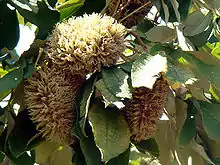Zeyheria tuberculosa
Zeyheria tuberculosa is a species of tree in the family Bignoniaceae. It is endemic to Brazil, and is threatened by habitat loss.[1]
| Zeyheria tuberculosa | |
|---|---|
 | |
| Scientific classification | |
| Kingdom: | Plantae |
| Clade: | Tracheophytes |
| Clade: | Angiosperms |
| Clade: | Eudicots |
| Clade: | Asterids |
| Order: | Lamiales |
| Family: | Bignoniaceae |
| Genus: | Zeyheria |
| Species: | Z. tuberculosa |
| Binomial name | |
| Zeyheria tuberculosa Burman | |
| Synonyms[2] | |
| |
Description
These trees reach a height of 15 to 23 meters, with a trunk diameter of 40–60 cm. The leaves are compound, made of five leaflets, and grow to 40–60 cm in length. The tree blooms between November and January, and its fruit ripens between July and September. The seeds are light-weight and wind-borne.[3]
Uses
It is cited as a timber tree, and also it is used as an urban tree.[4] The wood is flexible and durable. The tree is also used as an ornamental tree in landscaping. The fast growth and high reproduction rate allows this species to be used for the recovery of degraded areas.[3] This has been shown to improve soil of previously deforested regions, adding nitrogen and potassium in the added organic matter.[5]
Extracts from the tree, known as "ipê-preto", are used locally as medicine for cancer and skin-diseases. Laboratory tests have shown antimicrobial properties in these extracts, but due to concerns about toxicity no clinical applications have been utilized.[6]
References
- World Conservation Monitoring Centre 1998. Zeyheria tuberculosa Archived June 27, 2014, at the Wayback Machine. 2006 IUCN Red List of Threatened Species Archived June 27, 2014, at the Wayback Machine. Downloaded on 24 August 2007.
- The Plant List: A Working List of All Plant Species, retrieved 18 September 2016
- (in Spanish) Viana, V. M.; Maurício, R. M.; Matta-Machado, R.; Pimenta, I. A. Manejo de la Regeneración Natural para la Formación de Sistemas Agroforestales Ganaderos, Agroforestria en Las Americas, v. 9, n. 33-34, 2002.
- (in Portuguese) Zeyheria tuberculosa at Instituto de Pesquisas e Estudos Florestais, University of São Paulo
- Reis, G. L.; Lana, Â. M. Q. O.; Maurício, R. R. M.; Lana, R. M. Q. O.; Machado, R. M.; Borges, I.; Neto, T. Q. (2009). "Influence of trees on soil nutrient pools in a silvopastoral system in the Brazilian Savannah". Plant and Soil. 329: 185. doi:10.1007/s11104-009-0144-5.
- Bastos, M.; Lima, M.; Conserva, L. M.; Andrade, V. N. S.; Rocha, E. M.; Lemos, R. P. (2009). "Studies on the antimicrobial activity and brine shrimp toxicity of Zeyheria tuberculosa (Vell.) Bur. (Bignoniaceae) extracts and their main constituents". Annals of Clinical Microbiology and Antimicrobials. 8: 16. doi:10.1186/1476-0711-8-16. PMC 2691395. PMID 19450272.
